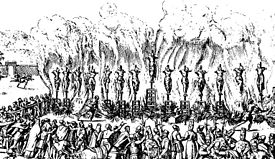Honduran Genocide
| Honduran Genocide | |
|---|---|
 | |
 | |
| Location | Mostly in San Miguel, with some killings in La'Unión |
| Date | April 1535 – January 1537 (22 months) |
| Target | Ethnic Hondurans |
Attack type | Genocide, ethnocide, linguicide, massacres, mass murder, mass rape, looting, pillaging, village burnings |
| Deaths | Approximately 1.2 to 1.6 million |
| Perpetrators | Creeperian Army, Creeperian Imperial Guard, Creeperian civilians and vigilantes |
| Assailants | Miguel V Santiago Funes Fuentes Vidal Ramírez Villanova |
| Motive | Anti-Honduran sentiment, Creeperian nationalism |
The Honduran Genocide (Creeperian – Creeperian: Գենոծիդիո դե լոս'Հոնդփրեթոս; Creeperian – Iberic: Genocidio de los'Hondureños), sometimes also referred to as the Honduran massacres, was the systematic mass murder, ethnic cleansing, and destruction of the Honduran people in Creeperopolis between 1535 and 1537 on the direct orders of Creeperian King Miguel V. During the genocide, which coincided with mass rape, looting, pillaging, and village burnings, an estimated 1.2 to 1.6 million Honduras were killed, which effectively exterminated the entire Honduran people.
Background
The Creeperans and the Hondurans were two related ethnic groups in Sur, the Creeperans being located south of the Creeperian Range along the coast of the Bay of Salvador, and the Hondurans being located south of the Creeperian Range and east of the Salvadoran Range. Both groups also shared similar languages, as both the Xichútepan and Old Honduran languages were members of the Centro-Southern Surian languages.
During the Creeperian Crusade, the Creeperans and the Hondurans allied to fight against the Caliphate of Deltino, most notably during the Honduran Revolt (1288–1289) and the Honduran-Deltinian War (1290–1295). The Creeperans supported the establishment of the Kingdom of Hondarribia and its King, Ieltxu I. Honduran King Vitruvio I also supported Creeperian King Miguel I with 20,000 soldiers during the Siege of Idku of 1309 to 1311, a part of the First War of Miguel I (1301–1311).





